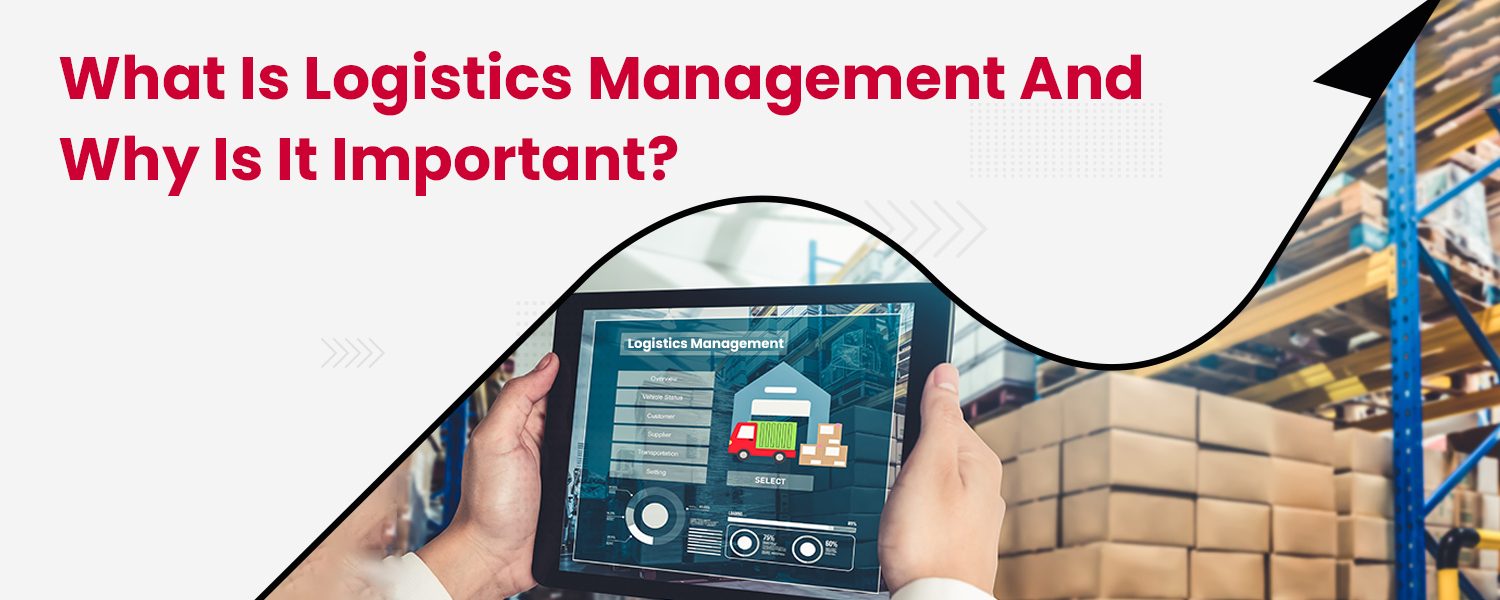In this competitive eCommerce environment where thousands of businesses enter and sell online, it is vital to focus on customer satisfaction rather than profitability. Probably, your competitors are selling the same quality products to the same set of customers that you do. Therefore, customer service is the only differentiator by which you can attract customers and gain their loyalty, and through efficient logistic management, you can lift the bar high. So stick with us because we will discuss what is logistics management and why it is so important.
What Is Logistics Management?
Logistics management is the unsung hero of the eCommerce world. Yet, it is a crucial component of any eCommerce business and helps get goods from point A to point B (and everywhere in between).
So what exactly is logistics management, and why is it so crucial for eCommerce businesses? In a nutshell, logistics management is the planning, execution, and optimization of the movement of goods and materials from one place to another. It involves everything from sourcing and procurement to transportation, warehousing, and inventory management, and it plays a crucial role in the overall success of the supply chain.
Logistics management helps reduce costs and increase efficiency by streamlining the supply chain and eliminating waste. In addition, it can improve customer satisfaction by ensuring that orders are delivered on time and in good condition. And in today’s fast-paced and competitive eCommerce landscape, these are two things that can make all the difference for your business.
For example, let’s say you run an online store selling handmade soaps. To meet demand, you need to source the ingredients for your soaps, produce the soaps, package them up, and then ship them to your customers. This is where logistics management comes into play – it helps you plan, execute, and optimize every step of this process to ensure that your soaps are delivered to your customers on time and in good condition.
Types of Logistics Management
Supply Management
Supply management is a crucial component of logistics management, and it involves identifying and selecting suppliers to provide the goods and materials needed to meet demand. But supply management isn’t just about finding the cheapest suppliers – it’s also about finding suppliers who can provide high-quality goods and materials in a timely and reliable manner. The role of supply management in the overall success of the supply chain cannot be overstated. By ensuring that businesses have the right goods in the right place at the right time, supply management helps reduce costs, improve customer satisfaction, and drive growth.
2. Distribution and Material Handling
Distribution and material handling are two sides of the same coin in logistics management, and they involve getting goods from the point of production to the point of consumption. Businesses can reduce costs, improve customer satisfaction, and drive growth by ensuring that goods are stored and handled efficiently.
This can involve a variety of activities, such as:
- Transportation: This involves moving goods from one location to another, which may involve multiple modes of transportation such as trucks, trains, planes, or boats.
- Warehousing: This involves storing goods in a warehouse until they are needed, and it may involve activities such as warehouse layout and design, inventory control, and order fulfilment.
- Inventory management: This involves managing the levels of inventory to ensure that there is enough to meet demand but not so much that it results in excess costs.
3. Product Management
Product management involves the planning and development of products, as well as activities such as pricing and marketing. Businesses can drive sales and increase customer loyalty by ensuring that products are well-designed and well-positioned in the market.
- Product planning and development: This involves identifying customer needs and developing products that meet those needs. It may involve activities such as market research, concept development, and prototyping.
- Pricing: This involves determining the optimal price for each product based on factors such as production costs, competition, and market demand.
- Marketing: This involves promoting products to potential customers through activities such as advertising, sales, and public relations.
4. Customer Service Management
Customer service management involves activities such as order processing and fulfilment, returns management, and customer support. You can improve customer satisfaction, increase loyalty, and drive sales by providing excellent customer service. For example, your eCommerce business can level up customer satisfaction by ensuring that orders are accurately and efficiently processed and shipped to customers by assisting customers with questions or issues related to their purchases. This can be done through phone, email, or chat channels.
5. Returns Management
Returns management is like a bane of many a retailer’s existence. But as much pain as it can be returns management is a crucial component of logistics management, and it plays a vital role in the overall success of the supply chain. By managing returns efficiently, businesses can minimize the cost of processing and handling returned goods. This can reduce overall costs and improve profitability.
Customers expect a seamless and hassle-free experience. Therefore, businesses can improve customer satisfaction and increase loyalty by making it easy for customers to return goods. Also, efficient return handling builds a positive reputation for the eCommerce brand with customers.
What Are the 4 Areas of Logistics Management?
Demand Forecasting
Demand forecasting is a critical activity that helps eCommerce businesses predict what their customers are going to want in the future and how much of it they’ll need. It is the crystal ball of logistics management. It helps businesses plan for the future. By forecasting demand, you can ensure that they have the right goods in the right place at the right time, which can help reduce waste and inefficiencies. It can also help businesses make more informed decisions about things like production and inventory levels.
Transportation Management
Transportation management is a critical component of logistics management. Transportation management helps businesses reduce costs and improve customer satisfaction by ensuring that goods are delivered efficiently and cost-effectively. There are a variety of transportation management activities that businesses can engage in to ensure that their logistics operation runs smoothly, such as:
- Route planning: This involves analyzing shipping patterns and identifying the most efficient routes for delivering goods.
- Shipping optimization: This involves analyzing factors such as cost, transit time, and capacity to determine the most cost-effective shipping method for each shipment.
- Tracking and monitoring: By tracking and monitoring shipments, businesses can ensure they are delivered on time and in good condition.
Warehousing And Inventory Management
Warehousing and inventory management are at the heart of logistics management because that’s where goods are kept and ready to dispatch to customers. These activities are all about ensuring that businesses have the right amount of inventory to satisfy the market needs and that they are stored and handled in a way that maximizes efficiency and cost-effectiveness. Businesses can improve customer satisfaction and drive growth by ensuring that goods are stored and handled efficiently.
Supply Chain Management
At its core, supply chain management is all about getting the right goods to the right place at the right time – and doing it as efficiently and cost-effectively as possible. It involves the planning and coordination of all the activities involved in the movement of goods from the point of origin to the point of consumption.
So what exactly is involved in supply chain management? Here are a few examples:
- Sourcing: This involves identifying and selecting suppliers to provide the goods and materials needed to meet demand.
- Production planning: This involves forecasting demand and determining how much of each product needs to be produced to meet that demand.
- Distribution: This involves getting the goods from the point of production to the point of consumption, which may involve multiple modes of transportation.
10 Major Importance of Logistics Management
Increases Profitability
Efficient logistics management can do wonders. eCommerce businesses can reduce costs and increase profitability by streamlining the supply chain and eliminating waste. This can help save money on things like transportation and warehousing, which can directly impact the bottom line. In addition, good logistics management leads to repeat business and positive word-of-mouth marketing. All of these factors combined can help drive profitability for an eCommerce business. So if you want to boost your bottom line, don’t overlook the power of efficient logistics management.
Improves Customer Experience
Logistics management plays a crucial role in improving the customer experience by ensuring that orders are delivered on time. This can be achieved through careful planning and coordination of all the activities involved in the supply chain, such as transportation, warehousing, and distribution. By optimizing these processes, eCommerce businesses can reduce delivery times and meet customer expectations for timely delivery.
Logistics management can also help improve the customer experience by providing transparency and visibility into the delivery process. Customers today expect to have access to real-time tracking information, and logistics management can help provide this through the use of technology such as GPS tracking and online tracking systems.
Reduces Operational Cost
Logistics management can be a major game-changer when it comes to reducing operational costs for businesses. One of the main ways it does this is by streamlining the supply chain and eliminating waste. In addition, by optimizing the flow of goods and information throughout the supply chain, businesses can reduce the number of steps and intermediaries involved, which can help reduce costs and improve efficiency.
Overall, the key to reducing operational costs through logistics management is to take a holistic view of the supply chain and identify opportunities for improvement at every step. As a result, businesses can save money, improve efficiency, and drive growth by doing so.
Ensures Seamless Delivery
Logistics management is crucial in ensuring the seamless delivery of orders to customers. This involves overcoming challenges that may arise in the supply chain, such as unexpected delays or disruptions. One of the main ways that logistics management helps overcome these challenges is by implementing contingency plans. Contingency planning is anticipating potential problems and developing strategies to mitigate their impact.
Another way that logistics management helps ensure seamless delivery is by implementing robust systems and processes to monitor the supply chain and identify potential issues before they become major problems.
The Success of the Supply Chain
If you want your supply chain to be a smooth-running machine, then efficient logistics management is a must! When logistics is running like a well-oiled machine, it can hugely impact the supply chain’s overall success.
First and foremost, it helps ensure that orders are delivered on time. Nobody wants to wait around forever for their goods to arrive, so getting things to customers quickly and efficiently is key. It also helps reduce the risk of errors and mistakes when goods are shuffled around from one place to another, and let’s remember cost savings. Efficient logistics management can help businesses save money by streamlining the supply chain and eliminating waste.
Improves Warehouse Management
Warehouses are the heartbeats of any logistics operation. And if you want that heart to keep pumping smoothly, then efficient warehouse management is a must. But what exactly does logistics management have to do with warehouses, you ask? Well, logistics management plays a crucial role in warehouse organisation and inventory control. But efficient warehouse management isn’t just good for your inventory – it’s also good for the bottom line of an eCommerce business. By streamlining operations and reducing waste, you can save money on things like storage fees, markdowns, and labor costs. Plus, with a well-organized warehouse, tracking and managing goods is easier, which can help reduce the risk of errors and improve customer satisfaction.
Enhances Visibility
Effective logistics management is essential for business growth as it helps improve connectivity, interoperability, and visibility throughout the supply chain. By analyzing each stage of the supply chain in real time, businesses can gain valuable insights that can help control costs and identify efficiencies. This transparency can also help reduce failures and better meet customer demands. Ensuring that the supply chain is synchronized and well-managed benefits both companies and customers, making logistics management a key factor in driving business success.
Intelligent Route Planning
When it comes to logistics, getting from point A to point B can be more complicated than following the shortest distance on a map. That’s where intelligent route planning comes in.
Logistics management plays a crucial role in optimizing delivery routes to ensure that orders are delivered efficiently and cost-effectively. This involves using tools and techniques to analyze shipping patterns and identify the most efficient routes.
So what kind of tools and techniques are we talking about here? Here are a few examples:
- Geographic Information Systems (GIS): These systems use maps and spatial data to analyze and optimize routes.
- Transportation Management Systems (TMS): These systems allow businesses to plan, optimize, and execute shipments by analyzing factors such as cost, transit time, and capacity.
- Vehicle Routing Software: This software helps businesses plan routes for delivery vehicles by taking into account factors such as vehicle capacity, delivery time windows, and traffic conditions.
Risk Management
There’s always a bit of risk involved in logistics. Whether it’s a missed delivery deadline,
a lost shipment, or a natural disaster disrupting the supply chain, plenty of potential pitfalls can derail even the most carefully planned operation. That’s why risk management is so important in logistics. Risk management is the process of identifying, assessing, and prioritizing risks and developing strategies to mitigate their impact. By taking a proactive approach to risk management, businesses can reduce the likelihood of unexpected disruptions and ensure that their logistics operation runs smoothly.
To mitigate these risks, eCommerce businesses can implement contingency plans, invest in insurance, and work with reliable partners (which you can choose through the help of logistics aggregators, one as NimbusPost). Furthermore,
by taking a proactive approach to risk management, businesses can minimize disruptions and ensure that their logistics operation runs smoothly.
Scalability
As an eCommerce business grows and expands, logistics can become a major challenge. Suddenly, you’re dealing with a much larger volume of orders and a much wider geographic area,
and it can be tough to keep up with the demand. That’s where scalability comes in and logistics management plays a crucial role in preparing for business growth and ensuring that the supply chain can scale up or down as needed.
By implementing systems and processes that can be easily adjusted as the business grows, eCommerce businesses can ensure that their logistics operation remains efficient and cost-effective.
What is the most important part of logistics?
Transportation is the most important part of logistics. Because if you can’t get your goods from point A to point B, then everything else kind of falls apart. Transportation involves everything from choosing the right mode of transport (truck, train, plane, ship) to routing and scheduling to ensure that goods are delivered on time and in good condition.
What are the 3 types of logistics?
The 3 types of logistics are:
- 2PL (two-party logistics)
- 3PL (third-party logistics)
- 4PL (four-party logistics)
Conclusion
Here is the conclusion, logistics is more than just transporting goods. It is a thread that connects the whole supply chain of an eCommerce business. Therefore, you will need robust logistics management as your business grows and caters to a large audience. You’ll need lots of planning, analyzing, and selecting the right logistics partner at the backend.
To bring expertise, you can also take use of logistics aggregators like NimbusPost. Their technology-driven platform provides a comprehensive logistics solution to eCommerce businesses like yours.




